





- September 23, 2024
- 127 Views
Things have changed dramatically over the years with new opportunities, techniques, and future advancements. Real estate is the best industry to invest in, though the procedure sometimes irritates. Metaverse app development companies have extended their wings to eliminate those real estate problems and are still expanding; for instance, the metaverse of this technology has yet to be explored further.
We can understand this through the quote: “Metaverse isn't a thing a company builds. It's the next chapter of the internet overall.” Yes, the next chapter is yet to come, though we have understood its major functioning and how it could be aligned with different types of businesses.
Many users may find a virtual office and workplace vague, but this is the idea of today’s need. You either love it or hate it, but you can’t ignore it. In the same way that technology works, some sections of society try to explore it, and conversely, others profit from it. Still, the truth is this is a hot topic of discussion, which needs to be discussed to change the picture of the world entirely.
Today’s blog will explore how deeply a real-estate business needs a metaverse application to strengthen it on different grounds.
-
Table of Contents
-
- 1. Role of Metaverse in Real-Estate
- 2. How Does Metaverse Work in Real-Estate?
- 3. How the Metaverse is Revolutionizing Property Tours and Remote Viewings
- 4. The Future of Real-Estate in the Metaverse
- 5. Key Benefits of Metaverse Apps for Real Estate
- 6. How Much Does it Cost to Buy a Real Estate Property in Metaverse?
- 7. What factor influenced the prices?
- 8. Conclusion
- 9. FAQs
-
Role of Metaverse in Real-Estate
The quantum leap in technology has reached the point where it can dramatically change the world. In the real world, people can find their dream property with less effort without compromising anything.
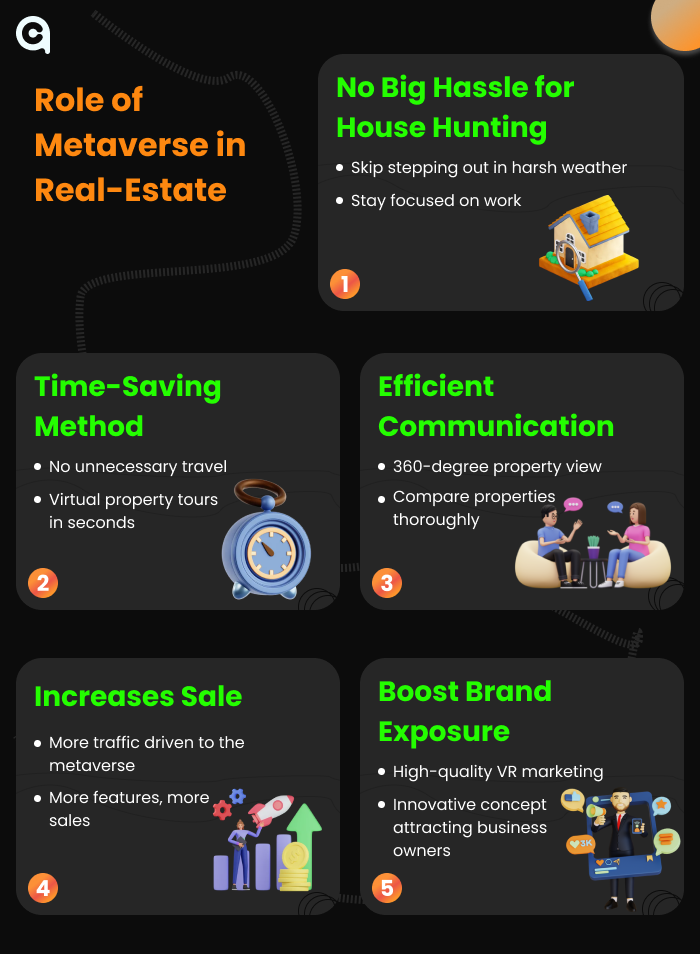
- No Big Hassle for House Hunting: Those days are gone when property dealers and buyers face the harsh weather to inspect their properties. Sometimes, users have to take the time from their product meeting, which can cause them to have a negative impact later. Therefore, to safeguard all those things, metaverse has introduced hassle-free house hunting, where users can tour virtually and check on each thing without stepping out.
- Time-Saving Method: Metaverse is a technological extension that can save your precious time from being destroyed on unproductive activities. Imagine you’re doing work, and just in a single call, you’re at a property site reviewing it; you know how productive, time-saving, and money-saving this approach is. Yes, this saves our time and directly comes to the point about buying and selling the property.
- Efficient Communication: AR-enabled mobile devices are designed to stimulate efficient communication with 360-degree views of the property. Users can easily browse, navigate, and compare the properties. The agent can relay each thing in a detailed manner, and simultaneously, the user can validate it to achieve a higher satisfaction level.
- Increases Sale: For years, home staging has been a successful method of increasing sales; for instance, through home staging, there is a 20% chance of purchasing the property at the given time, but with the emergence of the metaverse, the technique has evolved into the online coating.
- Boost Brand Exposure: Real estate industries focusing on high-quality VR marketing are more likely to boost their brand by acquiring clients through websites, social media platforms, and other means. Metaverse in real estate is still a new concept, though, at an initial level, companies will develop more brand recognition and profit to stay ahead in the market.
How Does Metaverse Work in Real-Estate?
Let's understand the metaverse before delving into its functioning and how it works. Metaverse is a computer-generated space where users interact, socialize, and do business to expand their networks. In real estate, users come to the virtual space to buy, sell, and lease the property to do further business. These concepts combine augmented reality, virtual reality, and blockchain to provide solid online functioning. It is the methodology for taking the metaverse real estate business online to mitigate the risk factors.
Real estate app development company uses certain codes and algorithms to keep things running smoothly. It takes you to another virtual world where you can buy or sell property and become a focal point in the market.
How the Metaverse is Revolutionizing Property Tours and Remote Viewings
Metaverse app development services can revolutionize property tours in many ways. Through AR, VR, and metaverse, it creates diverse windows to build an immersive world. It offers virtual property tours, transactions, real estate investment, leasing, and more. Let’s dive deeper to understand this meticulously.
Virtual Tour: Real estate properties are primarily represented on the 3D model to navigate the property virtually. It allows users to explore the property without leaving the couch. Apart from just visiting the property, users can explore it internally and externally to check its longevity and structure.
Property Transactions: Virtual home tours, buying, and selling property are reliable on many levels as they support blockchain-integrated transactions often facilitated through blockchain technology. Conversely, smart contracts are used to ensure secure, transparent, and tamper-proof transactions. Also, properties in real estate are known as non-fungible tokens (NFTs), which provide proof of ownership and can be traded or sold like physical real estate.
Virtual Real Estate Development: This functionality helps users own land within the metaverse to develop their properties or businesses. The land can be customized and developed according to the owner’s preferences. With the help of virtual construction tools and assets, users can build a design structure within the digital premises without moving under the burning sun.
Above, we understood how a metaverse revolutionized property tours and promoted remote viewing. Now let’s move further to understand each thing deeply.
The Future of Real-Estate in the Metaverse
Real estate app development companies are an emerging asset that should be preserved and extended. With their solid tech foundation and popularity, they have much to offer in the future.
- Virtual Property Ownership: It is estimated that real estate will become a popular option for visiting properties virtually. It involves buying, selling, and developing land within digital worlds. Platforms like Decentraland, the Sandbox, and others allow users to purchase plots of virtual land. This ownership is represented by NFTs (Non-Fungible Tokens), which provide proof of ownership of virtual property and how it is being traded.
- Economic Opportunity: By enabling the virtual tour, or metaverse in real estate, investments are likely to speculate on virtual properties, hoping for future value increases. This could lead to high volatility and speculative bubbles. Virtual real estate has become a mainstream regulatory framework that evolved to address issues like ownership disputes, taxation, and digital rights management.
- Virtual Purchasing power: It empowers users with the virtual purchasing power to sell, buy, and lease out the property. With the NFTs, virtual property transactions have become seamless and increased with time.
- Security measurement: Metaverse in real estate, on the other hand, involves assessing and managing various aspects of property security to ensure the property and reduce risks and occupants. It focuses on the integrity of the virtual world and its users.
- Challenges and risks: Real Estate Metaverse is an exciting concept with a few backdrops and challenges. For instance, the legal framework for virtual real estate is still developing under various jurisdictions. This uncertainty can lead to disputes over property rights, taxation, and compliance with local news. The metaverse also heavily relies on advanced technologies such as blockchain, AR/VR, and AI, which are still maturing. Severe development issues can arise, which would be a technological backdrop.
Do you still have questions about real estate business needs?
Contact us to transform your real estate business with our exceptional app development services. Experience timely delivery and 24/7 support. Discover Codeaegis as your ideal business partner.


Key Benefits of Metaverse Apps for Real Estate
Metaverse in real estate is still a young topic, but it vividly replaces the traditional market. With an extensive future approach, it is leaping to grab opportunities in one go.
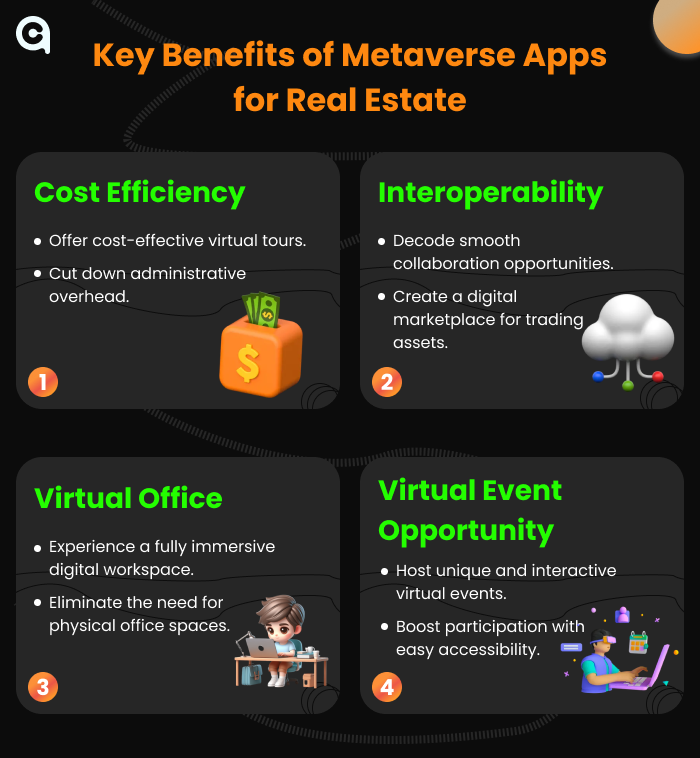
Cost Efficiency: Metaverse apps allow real estate businesses to reduce costs by removing the need for visiting at physical site visits and expensive marketing materials. Virtual tours, digital showrooms, and 3D modeling enable potential buyers to explore properties anywhere worldwide, reducing travel and administrative expenses.
Interoperability: Interoperability in the metaverse refers to the integration between different virtual platforms and systems. For real estate, it allows an open gate for collaboration, investment, and the creation of a unified digital real estate market where assets can be traded, leased, or sold across various metaverses.
Virtual Office: It provides virtual offices where clients, agents, and stakeholders can interact in a fully immersive digital environment. These virtual offices can replicate the experience of the physical office, allowing for meetings, negotiations, and presentations to take place without the need for the physical location.
Virtual Event Opportunity: The metaverse provides a unique platform for hosting virtual events, such as property launches, open houses, and real estate expos. Participants can come from around the globe, providing interactive, engaging experiences. Virtual events in the metaverse offer opportunities for networking, showcasing properties, and connecting with potential buyers and investors dynamically and innovatively.
How Much Does it Cost to Buy a Real Estate Property in Metaverse?
To accurately answer cost, real estate businessmen rely on different kinds of Metaverse platforms like Decentraland, The Sandbox, and Somnium Space. Buying a virtual property in the metaverse may differ for various reasons, such as the platform, location, size of the property, and current market trends. Here is an estimated budget range for the virtual property: Low-End: $500 - $2,000 (small plots in less popular areas), Mid-Range: $5,000 - $20,000 (medium-sized plots in semi-popular regions), and High-End: $100,000 - $1,000,000+ (prime locations or large estates).
Platform Variability: Platforms like decentral, the sandbox and Cryptovoxels are popular among metaverse business owners. Due to their advanced establishment, user base, and development environment, prices for these platforms are supposed to be higher.
Location: In the physical world, virtual properties located in high-traffic areas, near famous landmarks, or in central hubs are significantly more expensive. Similarly, properties in less developed or remote areas of the metaverse are generally more affordable.
Property size: The cost of the virtual property varies, as small parcels of land can cost a few hundred dollars, especially if they are in less popular areas. Conversely, larger estates or multiple parcels together can be much more expensive, potentially ranging from tens of thousands to millions of dollars.
Market Trends: Virtual real estate prices are highly speculative and can fluctuate. During a favorable period, prices can go up, while in less active times, they can drop significantly. Additionally, cryptocurrency influences like Ethereum highly influence metaverse real estate properties, which can impact market price.
Conclusion
To conclude, the metaverse real estate market is trendy and revolutionizing the market from scratch. However, this technology will be a blessing, along with the ease of site-visiting property analysis. Each business owner can quickly make a profit and set up the business without any risks or fraudulent activities in mind.
Frequently Asked Questions
What is the Metaverse, and how does it relate to real estate?
Metaverse is a 3D space where users can interact with each other in a shared virtual space. In real estate, it allows virtual property tours, transactions, and immersive experiences, elevating the property selling and buying experience.
How can Metaverse apps improve the buying and selling process in real estate?
The metaverse apps have enhanced real estate by offering virtual property visits, extended visualizations, and seamless communication. Improved security measures and purchases have made the virtual real estate industry more affordable and reliable.
How much does it cost to build a real estate metaverse application?
The cost to build a real estate metaverse application varies depending on numerous factors. However, we could make a wild guess of around $35,000 to $300,000. Connect with codeaegis experts with your detailed requirements to determine the accurate cost.
About Author
You May Also Like

Picture this - a world where business transactions are seamless, secure, and transparent. This might have seemed like a distant dream before the advent of cryptocurrencies and blockchain technology, b

An extensive background working in Tech, Travel, and Education Industries. Currently involved in entire business operations process: Benefits strategy and implementation, systems integration, Human Re

Lately, the tech world has been abuzz with talk of the Metaverse, a groundbreaking concept that promises a shared virtual space where people can interact and engage with one another. This futuristic i
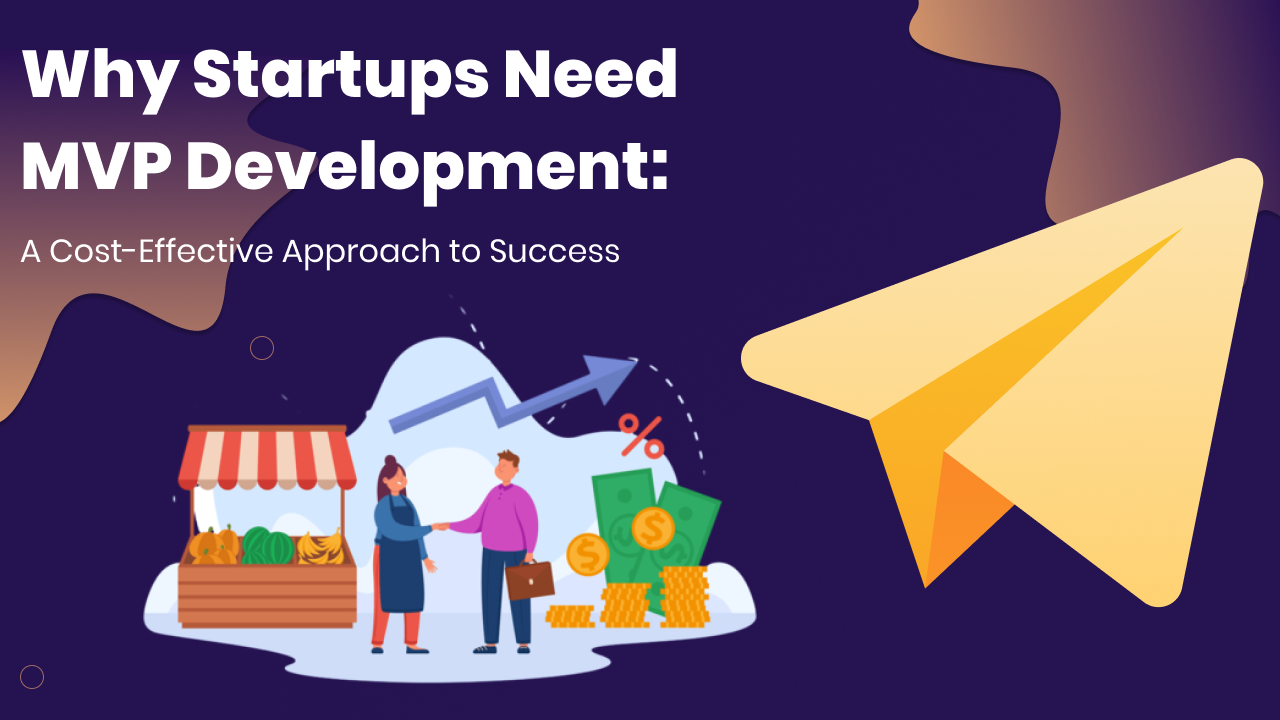
The startup space is fast, competitive, and harsh. According to Exploding Topics, about 90% of startups fail. What would be the reason for that? There would be multiple reasons for startup failure, bu

In recent years, the gaming industry has seen a surge in popularity, with many gamers turning to online gaming platforms and console games in order to escape reality. With so many people playing video

Do you run your own business and want to build an Android app? If yes, you must know about the latest technology trends playing a significant role in the android app development process. Technology i

Nowadays, the financial industry has encountered massive digitization, and mobile apps play a significant role in it. There are a wide variety of money transfer apps available, catering to the needs a

DeFi is a new kind of investment that’s taking the world by storm. So what is it? Essentially, DeFi is a digital asset class that allows you to invest in cryptocurrencies and other digital asset

The two hottest frameworks in the mobile app development world are Flutter and React Native. They’re both cross-platform solutions that allow you to write code once and deploy it to Android and

Do you know what digital transformation with AI is and how it can impact your business? Organizations today are under pressure to digitally transform to stay competitive. This digital transformation
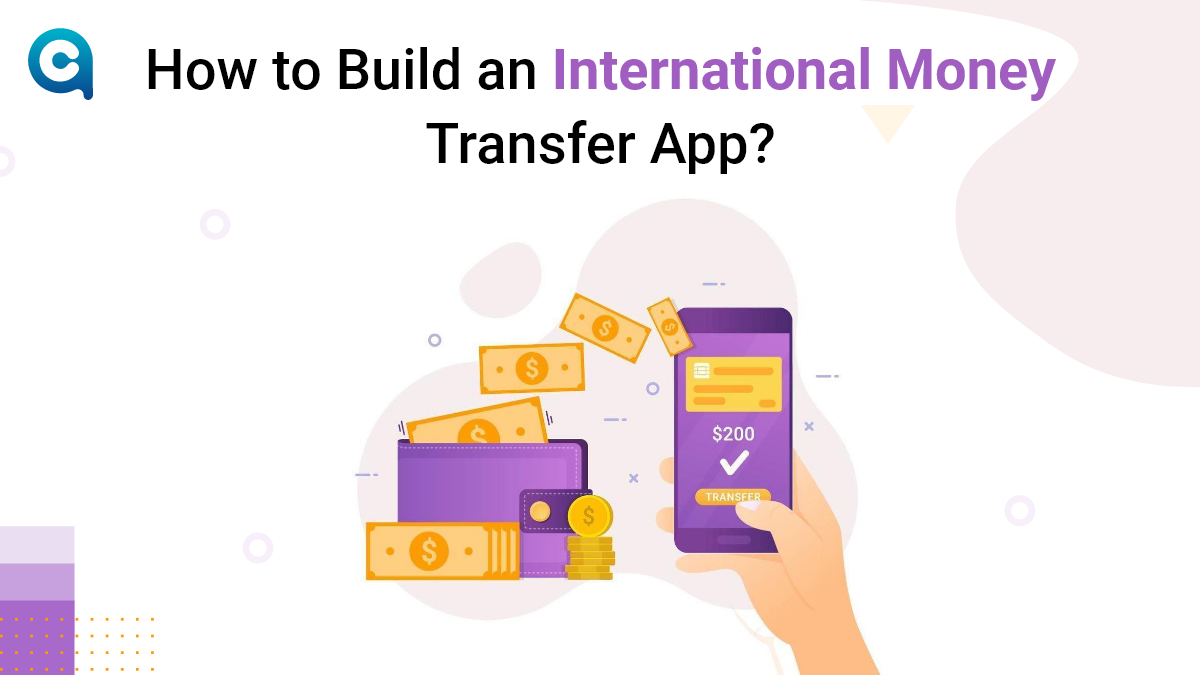
The introduction of online payment applications has changed how people perform financial transactions. A mobile phone with a banking app lets you quickly resolve various financial matters. Ta
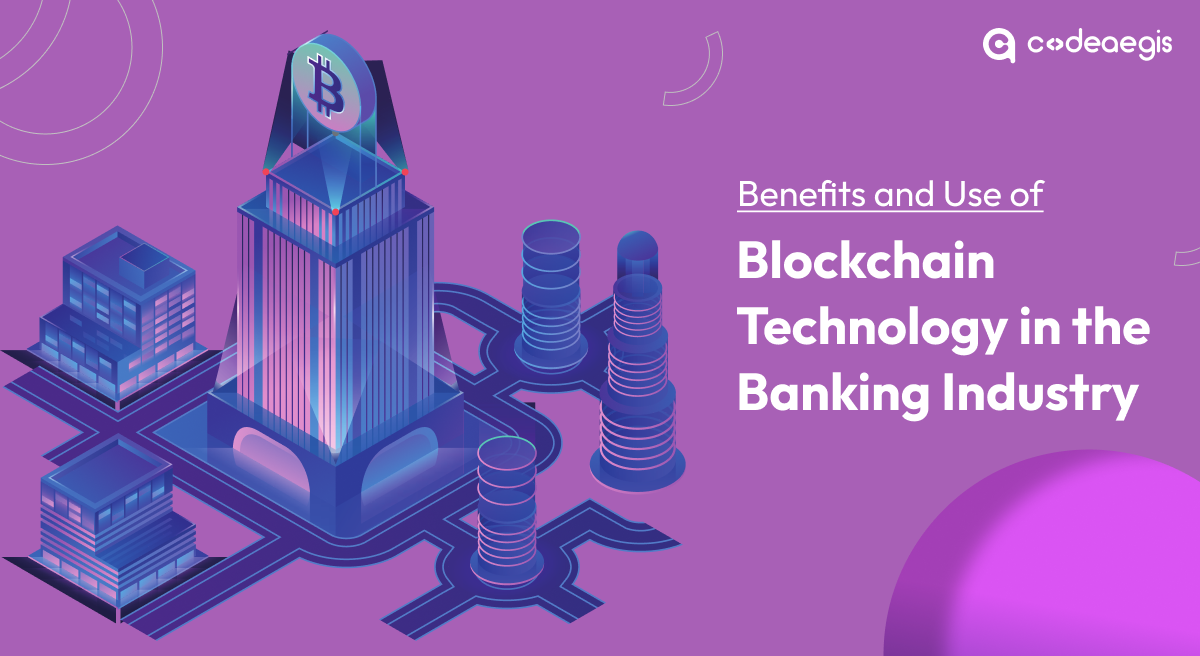
Picture this: a world where traditional banking transforms into a cutting-edge, efficient, and transparent system that leaves everyone in awe. Blockchain, often met with skepticism and uncertainty, is

Building an App that promotes businesses and acts as a right hand has a separate fanbase! Creating an app for the business plays a fundamental role in elevating business operations, making seamless c

If you’re in the healthcare industry, then you know that data privacy and security are of utmost importance. In order to protect patients’ information, the Health Insurance Portability and

Can you give thought to a week without coffee breaks at cafes? It might not be possible, but earlier, having coffee outside the house was never a thing. So how the tables have changed the corners?
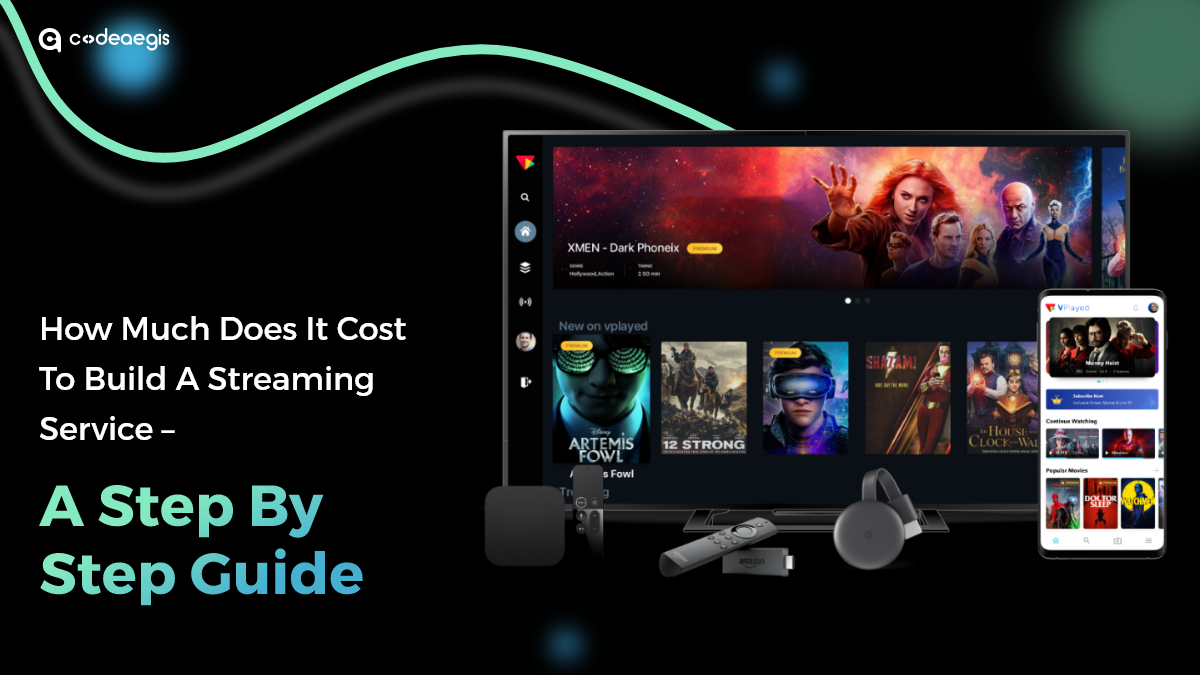
The rise of online video streaming services has revolutionized the entertainment industry, prompting businesses worldwide to explore the possibility of launching their own platforms. With giants like

Table of Contents 1. What is Flutter? 2. Why Choose Cross-Platform Development? 3. Why is Flutter the Best Platform to Make Cross-platform Applications? 4. How Much Does it Cost to

Social media apps are all the rage these days. People use them to connect with friends and family, to learn about new products and services, and to stay up-to-date on the latest news. But as popular a

Depending on what niche you’re in, video chat apps are becoming increasingly common in the world of business and technology. Whether it’s a small startup company or a multinational corpora

If you’re planning to enter the fast-growing fantasy sports market, one of the most critical aspects considered is “What will it cost to build a fantasy sport that stands out and drives t

Mobile applications have dominated the market, helping businesses to reinforce their full potential. Not only for the rental business, but mobile apps play a critical role in establishing a solid foun

The world of gaming is rapidly evolving, and the latest buzzword is "metaverse." The term refers to a virtual world where users can interact with each other and digital objects in real time, using imm

With the advent of technology, the financial industry has experienced a massive transformation in the past few years. Fintech applications have revolutionized the way we manage and invest our money.

Sipping coffee and thinking of a startup has always been trendy. Similarly, hanging out with friends and promising them to start a business someday feels refreshing. Did you know that several success

By 2024, we all know that technology will be the future. What excites me the most is that technology has covered all the dimensions of businesses, enabling them to attain their potential and efficienc
The beacon technology market was valued at 519.6 million U.S. dollars in 2016, and it was estimated to increase at a CAGR of 59.8% to reach about 56.6 billion U.S. dollars in size in 2026. Throughout

Rental businesses are gaining market share by offering essential services that help other businesses minimize downtime and maximize profitability. This growth trend is particularly strong in the servi

Necessity is the mother of invention origin! Have you ever wondered when an entrepreneur decides to start a business? When demand is high and supply is low, opportunities arise. But there’s mor
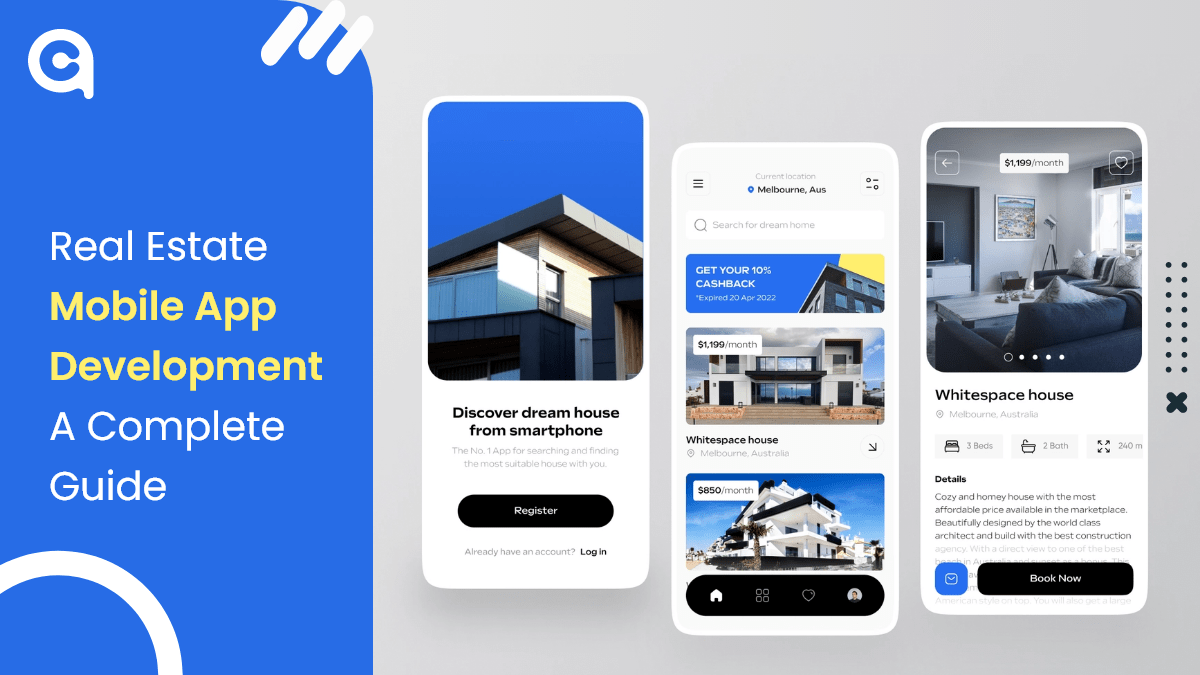
The world is digitizing at a very rapid pace, and in such a scenario, real estate businesses must also go digital to stay ahead of the competition. One of the best ways to digitize your business is de

Augmented Reality and Virtual Reality are the two leading buzzwords in the technology era. What began as a completely new, significantly different technology has rapidly revolutionized into something

Gone are the days when people used to wave down a taxi on the street or wait for one at the airport. With the advent of technology, people can now book a taxi with just a few taps on their smartphones
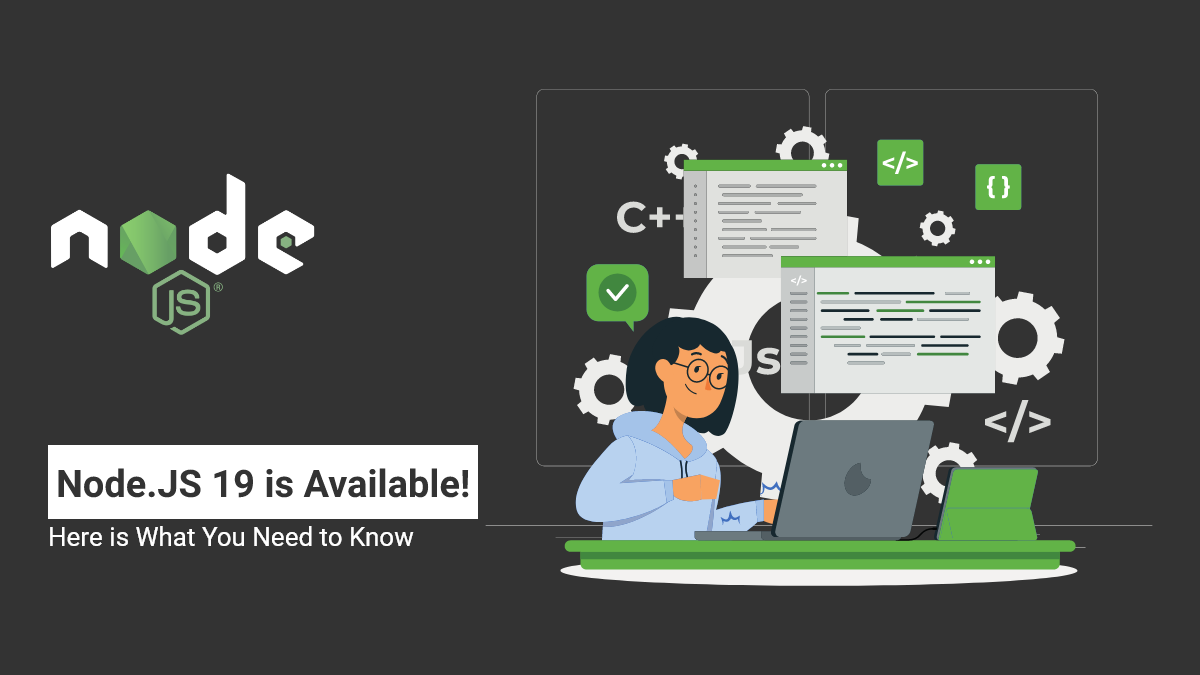
The launch of Node.js 19 is now available! It substitutes Node.js 18 as the current launch line, with Node.js 18 being encouraged to long-term support (LTS) next week. What do these two launches mean

When it comes to developing an app, there's a lot to consider. Not only do you need to create a user-friendly interface and design, but you also need to make sure your app is able to meet the demands

Decentralized Finance (DeFi) is a modern and evolving region of finance that is less centralized and more open to innovation and collaboration. DeFi enthusiasts laud its prospect of disrupting convent

Things have changed dramatically over the years with new opportunities, techniques, and future advancements. Real estate is the best industry to invest in, though the procedure sometimes irritates. Me

Want to establish a new business or improve an existing one? You should consider using blockchain technology Being a distributed database, Blockchain allows for secure online transactions. This techn
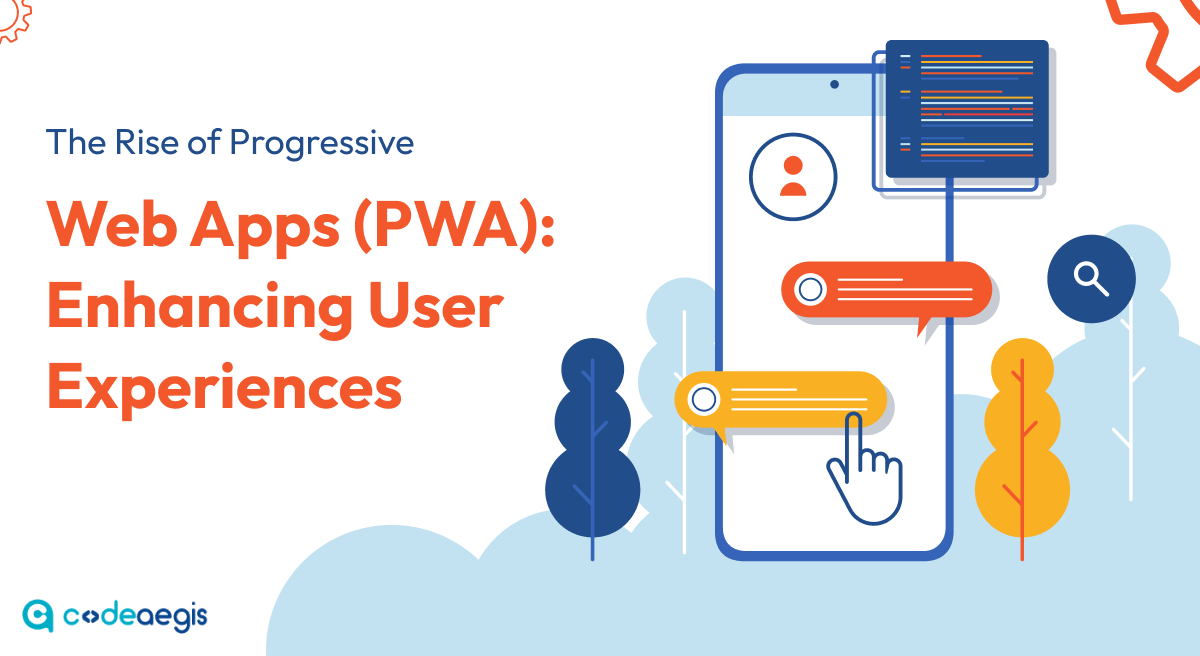
In today's digital world, businesses must keep up with ever-increasing consumer expectations and find new ways to engage their audience. That's where Progressive Web Apps (PWAs) come in. PWAs are a r

IPTV has established itself as a prominent technology that is gaining traction with its comprehensive platform applications. Unlike traditional methods like satellite, cable, or TV, IPTV has accelera

The food delivery application has innovative, game-changing features that will transform the industry from the bottom to the top. According to Statista, the online food delivery market in the UAE has

Google released Android 13 beta 4 to the public, and with it comes a slew of new features and updates. In this article, we'll walk you through everything you need to know about the latest version of A

Mobile applications play a vital role in the development of multiple businesses in this digital world. Most companies are investing in iOS app development to strengthen their market appearance and dra

The gaming industry is proliferating with the advent of smartphones and PCs. Every age group, from children to adults, is well-engaged and fond of online gaming. The rapid evolution of mobile gaming a

You’ve likely heard the term “Artificial Intelligence” or AI until now—It’s 2025. But have you ever paused to consider how deeply AI has woven itself into the web of our

Technology has come a long way in the past decade, and augmented reality (AR) is one of the most exciting development fields. AR technology superimposes digital content into the real world, creating a

It's no secret that the digital world has transformed many aspects of our lives, and it is only going to continue changing in ways we can't even imagine yet. To help businesses keep up with this rapid

Have you ever found yourself in a situation where you desperately needed a product or service but didn't have the time or energy to go out and get it? Well, fear no more because on-demand delivery app

The mobile app market has grown to a staggering size, with over 1.8 million apps available in the Google Play Store and Apple App Store combined. Mobile apps have become a necessity for people worldwi

The United Arab Emirates (UAE) is flourishing as the hub for blockchain technologies, transforming the digital ecosystem and having a forward-thinking government to maintain its competitive edge. Gove

Is your business still relying on off-the-shelf software solutions that don’t efficiently meet your unique business requirements? If your mind instantly says yes, then let’s explore why in

Are you looking to design a mobile app in 2025? Mobile application development is an ever-changing field, and it can be hard to keep up with the latest trends and best practices. But with this guide,

Generative AI? Is this still a question mark to you? If you don’t know what generative AI does, that would be a fair question, but it was not if you said that you haven’t interacted with

Do you want to build a simple app for your business? Do you want to create an app that enhances the experience of users who play games on their smartphones? Whatever your reason, I have created this g

Are you aware that the world is going through a significant shift in the way we make payments? According to a recent report by Deloitte, the total value of digital payments worldwide is estimated to r

The healthcare industry is one of the most rapidly changing and growing industries worldwide. Mobile devices and apps have drastically changed how providers and patients interact and communicate.So, i
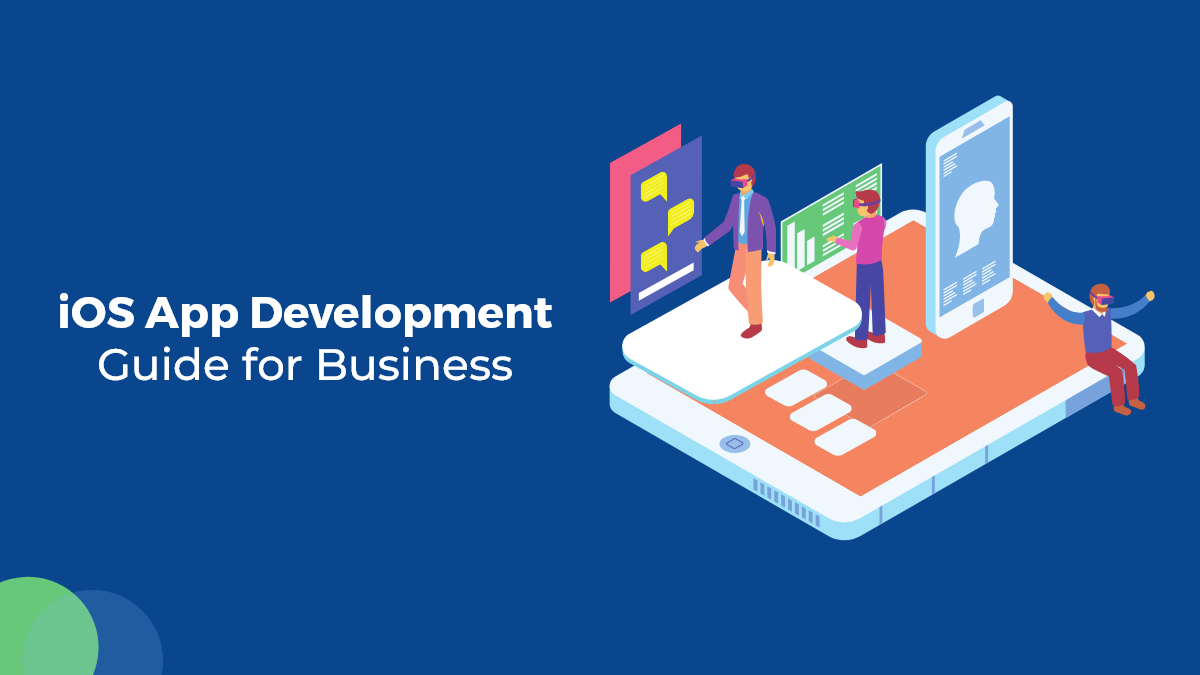
Businesses these days are looking to have an edge over their competition by having a strong online presence. A website is not enough anymore, and many companies are turning to mobile apps as a way to
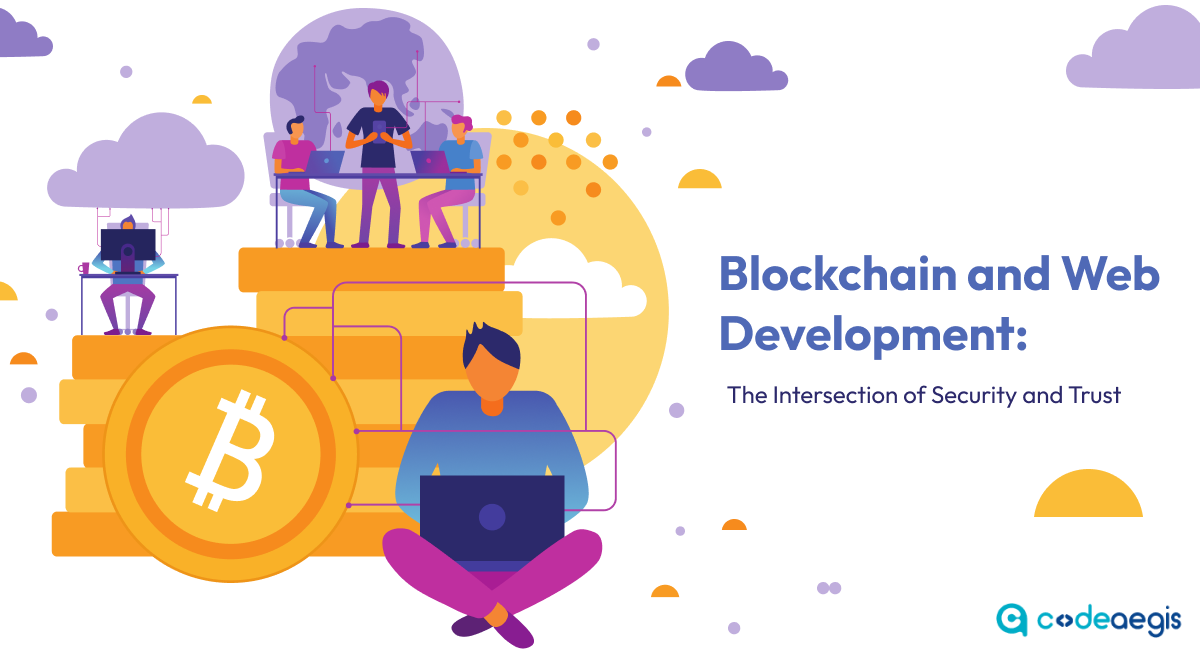
Blockchain technology and web development are two powerful innovations that have the potential to transform our world. While they may appear distinct, they share similarities and can work together to

Application development is essential to fostering business efficiency while accepting new changes. Depending on the specific requirements, 85% of businesses rely on software development solutions to s

As the world of startups becomes increasingly competitive, building an MVP is crucial for entrepreneurs looking to test their ideas and launch successful businesses. By creating a minimum viable produ

As we head into the future, more and more people are looking to find ways to improve their healthcare. And with good reason - healthcare can be expensive, and it can be difficult to get the right care

Did you know that Dubai's prime residential market is projected to experience the world's strongest growth in 2025? The Middle East is buzzing with opportunities, especially in the realm of mobile app

Mobile app development is quickly becoming a necessity for businesses. As the world becomes increasingly digital, companies of all sizes rely on mobile apps to reach customers and increase customer en

Hiring a team of remote developers can be a daunting task, but it doesn't have to be. With a little bit of planning and the right approach, you can find the perfect candidates to build your dream prod

Summary: Car rental apps have become the heart of the business, stimulating growth, efficiency, and customization. They offer updated rental methods to stay relevant with Gen Z and Millennials, who ar
Have you ever felt like you’ve attracted 30% more consumers to your shopping sales by using a technical hack to revive your shops? It would work like a person was crossing through next to your

Businesses after COVID are going through several changes, and the food industry is no different. Restaurants that have been doing dine-in are now struggling to keep up with the demand for delivery and

As blockchain technology continues to evolve, so too does the landscape of projects built on its foundation. The worldwide Blockchain market is predicted to expand at a CAGR of 42.8% (2018-2023), dire

When it comes to mobile app development, one of the most important things you need to consider is the prototyping process. This will allow you to create a working model of your app so that you can tes

Blockchain technology has been a hot topic recently due to its potential to revolutionize various industries. Blockchain is a distributed ledger technology that ensures transparency, security, and dec

Over the past decades, the healthcare sector has continuously expanded its wings, moving from traditional to advanced technological processes. This evolution is driven by the sector's unwavering commi

The UAE, and Dubai specifically, has really evolved from just a real estate and tourism market, and is quickly becoming a hub for digital innovation and online commerce. With the continued investment

Imagine a classroom where history comes alive in the 3D model of historical events. Biology students can explore the unique complexities of a cell as they have practiced it with real-world examples, a

Having a mobile application is no longer a luxury—it's an essential tool for instantly capturing the market! To stand out in the rental businesses, a company must adopt tech-driven preferences

Blockchain technology is becoming the heart of multiple industries. It is robustly securing businesses through its core value, making it the first pick-up in the generative AIs. The blockchain is the

Imagine a world where you can speak your thoughts and desires, and the digital realm responds promptly, seamlessly integrating into your daily life. Whether you want to search for information, contro

Australia is moving towards a big shift at a global level. It is strengthening the ties at the B2B level and becoming a hub for innovation, sustainability, and digital transformation. Backed with a r

The mobile app market has grown to a staggering size, with over 1.8 million apps available in the Google Play Store and Apple App Store combined. Mobile apps have become a necessity for people worldwi

Table of Contents 1. What is ChatGPT? 2. What Are the Top Benefits of ChatGPT? 3. How Does ChatGPT Work? 4. Challenges With ChatGPT 5. ChatGPT and the Future of AI 6. Final Thoug

Will DeepSeek and ChatGPT collide in the race for AI Supremacy? DeepSeek and ChatGPT are at the center of a heated debate that tends to shape the future of AI. The real-world implications and effecti

With the ubiquity of smartphones and tablets, it only makes sense that mobile app development - which is the process of creating applications for smartphones and tablet devices - is becoming more popu

In the last few years, wearables have become increasingly popular. Fitness trackers, smartwatches, and even smart glasses are becoming more and more commonplace. And as the technology improves and bec

Prime Minister Narendra Modi eventually launched 5G in India at the 6th edition of the IMC (India Mobile Congress). Reliance Jio and other telecom organizations documented the various use cases of 5G

Over-the-top (OTT) platforms like Disney Plus, Netflix, and Prime Video have gradually captured attention as traditional TV-watching methods have faded. Throughout the year, OTT platforms have created

Nowadays, the digital presence has revolutionized business dynamics. App development is not just evolving but breaking traditional barriers and emerging as strong and progressive solutions. With robus
Leave a Reply
Your email address will not be publishedDO YOU HAVE ANY PROJECT
Let's Talk About Business Solutions With Us
India Address
57A, 4th Floor, E Block, Sector 63, Noida, Uttar Pradesh 201301
Call Us
+91 853 500 8008
Email ID
[email protected]





.jpg)





